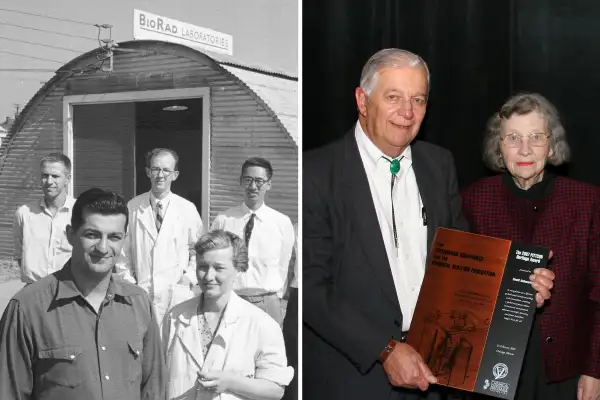This 92-Year-Old "Chemistry Maven" is America's Oldest Self-Made Female Billionaire

Biotech might be a buzzword right now, but America's oldest self-made woman billionaire has been in the game for more than half a century. Bio-Rad Laboratories co-founder Alice Schwartz, 92, is number 20 on Forbes' list of America's richest self-made women with an estimated net worth of $1.3 billion.
Today, Schwartz sits on Bio-Rad's board of directors and is the company's largest shareholder, according to Forbes, while her son Norman serves as chairman and chief executive. David Schwartz, Alice Schwartz's husband and company co-founder, died in 2012.
Now a $8.5 billion company by market value, Bio-Rad Laboratories started "by accident" during a 1952 game of bridge in Berkeley, Calif., according to a 2007 California Life Sciences Association interview with David Schwartz. The pair of Berkeley grads were joking with friends about scientific products that weren't on the market, Schwartz explained, when someone mentioned the tobacco mosaic virus.
"I said, 'gee, that's an interesting idea,'" said Schwartz, who went on to co-found Bio-Rad with his wife that same year. The tobacco virus, which was used in research, was difficult to prepare, according to a page on the Bio-Rad website, and "providing it in a ready-to-use format would save scientists valuable time and effort," the website says.
While the tobacco virus wasn't a hit, it was the beginning of a company that today makes and distributes more than 10,000 products for use by biologists, from pipets and resins to diagnostic testing systems. Bio-Rad went public in 1966, initially selling 40,000 shares for $3.50 a piece, according to the history section of the company's website. More than 50 years later, the company has about 25 million shares outstanding, which trade at $287.
Efforts to reach Alice Schwartz through Bio-Rad were not successful, and the co-founder doesn't appear to give interviews. While Schwartz may avoid the spotlight today, the Berkeley graduate was "the chemistry maven of Bio-Rad's early years," according to a 2002 SFGate article about the company, and managed finances later on. In his interview with the California Life Sciences Association, David Schwartz described Alice as "very knowledgable, very good with the numbers and very very bright."
Forbes' ranking gives Schwartz a self-made score of 8, which the website defines as a self-made person "who came from a middle- or upper-middle-class background," akin to Mark Zuckerberg. The scale ranges from one, meaning an entirely inherited fortune, to 10, a score that represents "someone who not only grew up poor but also experienced substantial hardships," according to Forbes. The nonagenarian has been a fixture of the Forbes' list of richest self-made women since it launched in 2015, according to an archived version of the website.